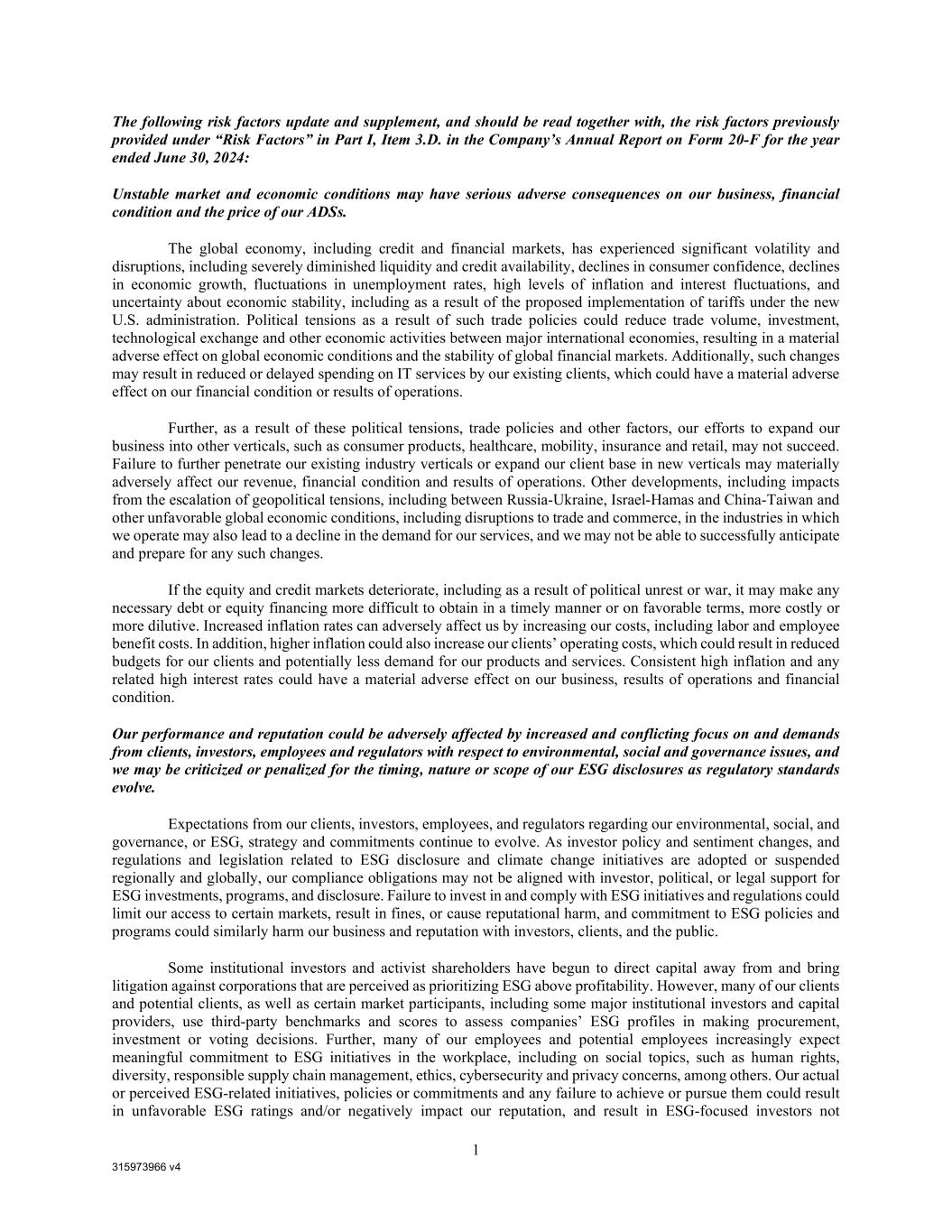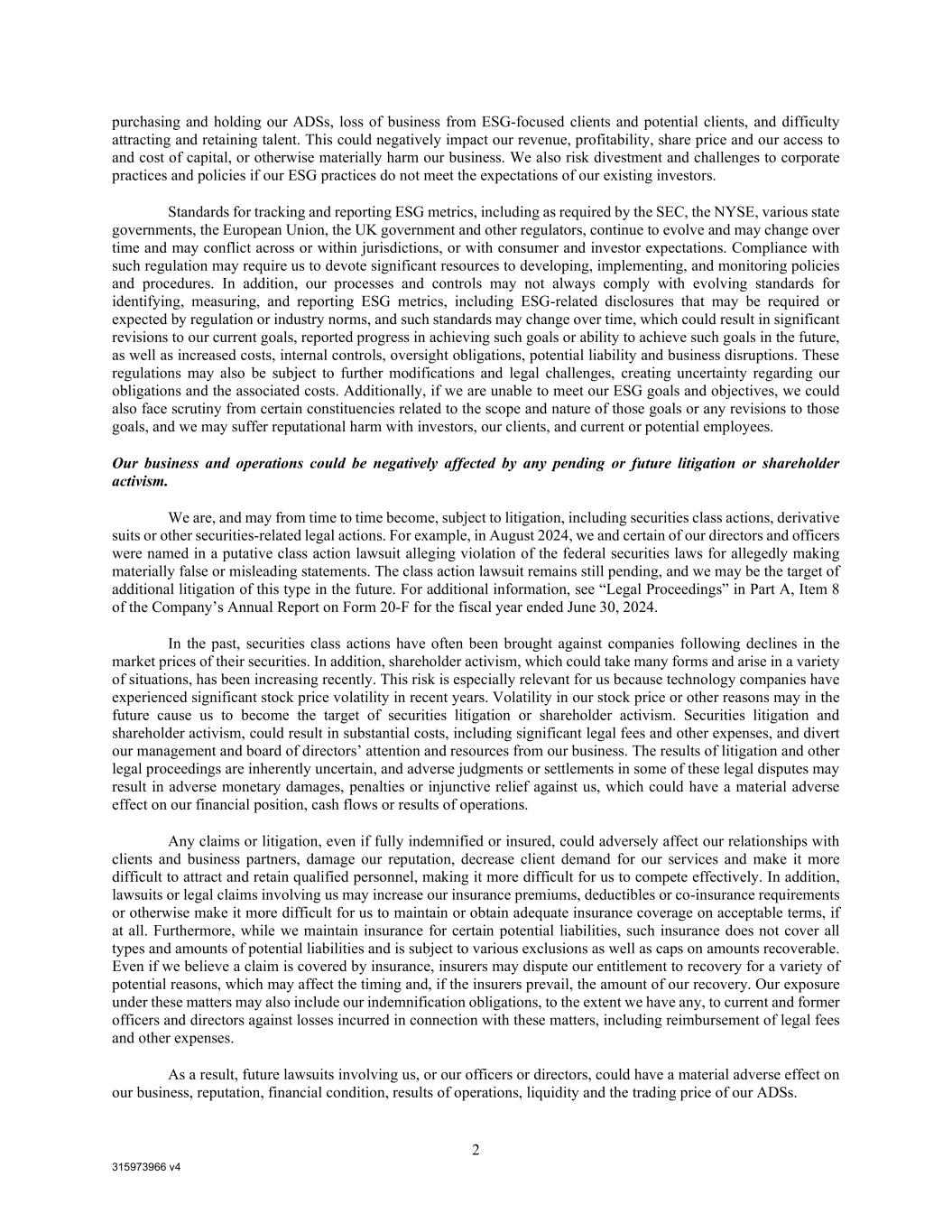EX-99.2
Published on March 28, 2025

315973966 v4 1 The following risk factors update and supplement, and should be read together with, the risk factors previously provided under “Risk Factors” in Part I, Item 3.D. in the Company’s Annual Report on Form 20-F for the year ended June 30, 2024: Unstable market and economic conditions may have serious adverse consequences on our business, financial condition and the price of our ADSs. The global economy, including credit and financial markets, has experienced significant volatility and disruptions, including severely diminished liquidity and credit availability, declines in consumer confidence, declines in economic growth, fluctuations in unemployment rates, high levels of inflation and interest fluctuations, and uncertainty about economic stability, including as a result of the proposed implementation of tariffs under the new U.S. administration. Political tensions as a result of such trade policies could reduce trade volume, investment, technological exchange and other economic activities between major international economies, resulting in a material adverse effect on global economic conditions and the stability of global financial markets. Additionally, such changes may result in reduced or delayed spending on IT services by our existing clients, which could have a material adverse effect on our financial condition or results of operations. Further, as a result of these political tensions, trade policies and other factors, our efforts to expand our business into other verticals, such as consumer products, healthcare, mobility, insurance and retail, may not succeed. Failure to further penetrate our existing industry verticals or expand our client base in new verticals may materially adversely affect our revenue, financial condition and results of operations. Other developments, including impacts from the escalation of geopolitical tensions, including between Russia-Ukraine, Israel-Hamas and China-Taiwan and other unfavorable global economic conditions, including disruptions to trade and commerce, in the industries in which we operate may also lead to a decline in the demand for our services, and we may not be able to successfully anticipate and prepare for any such changes. If the equity and credit markets deteriorate, including as a result of political unrest or war, it may make any necessary debt or equity financing more difficult to obtain in a timely manner or on favorable terms, more costly or more dilutive. Increased inflation rates can adversely affect us by increasing our costs, including labor and employee benefit costs. In addition, higher inflation could also increase our clients’ operating costs, which could result in reduced budgets for our clients and potentially less demand for our products and services. Consistent high inflation and any related high interest rates could have a material adverse effect on our business, results of operations and financial condition. Our performance and reputation could be adversely affected by increased and conflicting focus on and demands from clients, investors, employees and regulators with respect to environmental, social and governance issues, and we may be criticized or penalized for the timing, nature or scope of our ESG disclosures as regulatory standards evolve. Expectations from our clients, investors, employees, and regulators regarding our environmental, social, and governance, or ESG, strategy and commitments continue to evolve. As investor policy and sentiment changes, and regulations and legislation related to ESG disclosure and climate change initiatives are adopted or suspended regionally and globally, our compliance obligations may not be aligned with investor, political, or legal support for ESG investments, programs, and disclosure. Failure to invest in and comply with ESG initiatives and regulations could limit our access to certain markets, result in fines, or cause reputational harm, and commitment to ESG policies and programs could similarly harm our business and reputation with investors, clients, and the public. Some institutional investors and activist shareholders have begun to direct capital away from and bring litigation against corporations that are perceived as prioritizing ESG above profitability. However, many of our clients and potential clients, as well as certain market participants, including some major institutional investors and capital providers, use third-party benchmarks and scores to assess companies’ ESG profiles in making procurement, investment or voting decisions. Further, many of our employees and potential employees increasingly expect meaningful commitment to ESG initiatives in the workplace, including on social topics, such as human rights, diversity, responsible supply chain management, ethics, cybersecurity and privacy concerns, among others. Our actual or perceived ESG-related initiatives, policies or commitments and any failure to achieve or pursue them could result in unfavorable ESG ratings and/or negatively impact our reputation, and result in ESG-focused investors not

315973966 v4 2 purchasing and holding our ADSs, loss of business from ESG-focused clients and potential clients, and difficulty attracting and retaining talent. This could negatively impact our revenue, profitability, share price and our access to and cost of capital, or otherwise materially harm our business. We also risk divestment and challenges to corporate practices and policies if our ESG practices do not meet the expectations of our existing investors. Standards for tracking and reporting ESG metrics, including as required by the SEC, the NYSE, various state governments, the European Union, the UK government and other regulators, continue to evolve and may change over time and may conflict across or within jurisdictions, or with consumer and investor expectations. Compliance with such regulation may require us to devote significant resources to developing, implementing, and monitoring policies and procedures. In addition, our processes and controls may not always comply with evolving standards for identifying, measuring, and reporting ESG metrics, including ESG-related disclosures that may be required or expected by regulation or industry norms, and such standards may change over time, which could result in significant revisions to our current goals, reported progress in achieving such goals or ability to achieve such goals in the future, as well as increased costs, internal controls, oversight obligations, potential liability and business disruptions. These regulations may also be subject to further modifications and legal challenges, creating uncertainty regarding our obligations and the associated costs. Additionally, if we are unable to meet our ESG goals and objectives, we could also face scrutiny from certain constituencies related to the scope and nature of those goals or any revisions to those goals, and we may suffer reputational harm with investors, our clients, and current or potential employees. Our business and operations could be negatively affected by any pending or future litigation or shareholder activism. We are, and may from time to time become, subject to litigation, including securities class actions, derivative suits or other securities-related legal actions. For example, in August 2024, we and certain of our directors and officers were named in a putative class action lawsuit alleging violation of the federal securities laws for allegedly making materially false or misleading statements. The class action lawsuit remains still pending, and we may be the target of additional litigation of this type in the future. For additional information, see “Legal Proceedings” in Part A, Item 8 of the Company’s Annual Report on Form 20-F for the fiscal year ended June 30, 2024. In the past, securities class actions have often been brought against companies following declines in the market prices of their securities. In addition, shareholder activism, which could take many forms and arise in a variety of situations, has been increasing recently. This risk is especially relevant for us because technology companies have experienced significant stock price volatility in recent years. Volatility in our stock price or other reasons may in the future cause us to become the target of securities litigation or shareholder activism. Securities litigation and shareholder activism, could result in substantial costs, including significant legal fees and other expenses, and divert our management and board of directors’ attention and resources from our business. The results of litigation and other legal proceedings are inherently uncertain, and adverse judgments or settlements in some of these legal disputes may result in adverse monetary damages, penalties or injunctive relief against us, which could have a material adverse effect on our financial position, cash flows or results of operations. Any claims or litigation, even if fully indemnified or insured, could adversely affect our relationships with clients and business partners, damage our reputation, decrease client demand for our services and make it more difficult to attract and retain qualified personnel, making it more difficult for us to compete effectively. In addition, lawsuits or legal claims involving us may increase our insurance premiums, deductibles or co-insurance requirements or otherwise make it more difficult for us to maintain or obtain adequate insurance coverage on acceptable terms, if at all. Furthermore, while we maintain insurance for certain potential liabilities, such insurance does not cover all types and amounts of potential liabilities and is subject to various exclusions as well as caps on amounts recoverable. Even if we believe a claim is covered by insurance, insurers may dispute our entitlement to recovery for a variety of potential reasons, which may affect the timing and, if the insurers prevail, the amount of our recovery. Our exposure under these matters may also include our indemnification obligations, to the extent we have any, to current and former officers and directors against losses incurred in connection with these matters, including reimbursement of legal fees and other expenses. As a result, future lawsuits involving us, or our officers or directors, could have a material adverse effect on our business, reputation, financial condition, results of operations, liquidity and the trading price of our ADSs.